外研版(2019)必修第Unit 3 Family Matters Using language Tense 时态课件(共40张PPT)
文档属性
| 名称 | 外研版(2019)必修第Unit 3 Family Matters Using language Tense 时态课件(共40张PPT) | 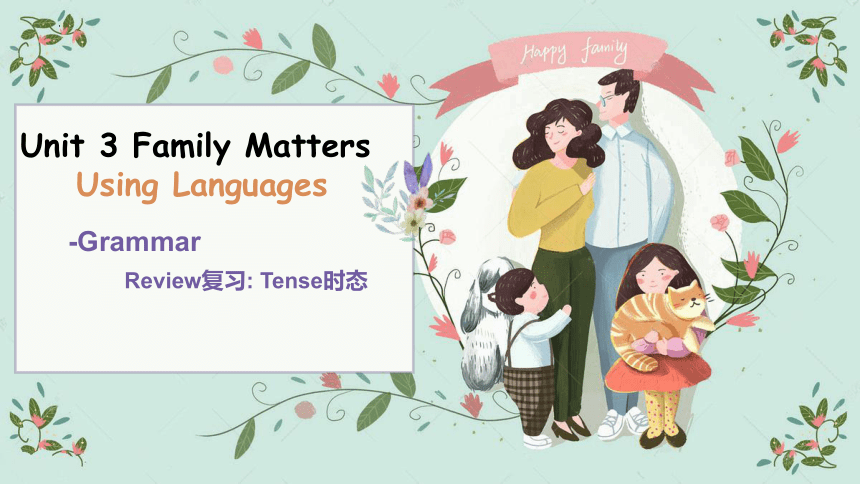 | |
| 格式 | pptx | ||
| 文件大小 | 22.7MB | ||
| 资源类型 | 教案 | ||
| 版本资源 | 外研版(2019) | ||
| 科目 | 英语 | ||
| 更新时间 | 2024-03-07 15:06:40 | ||
图片预览

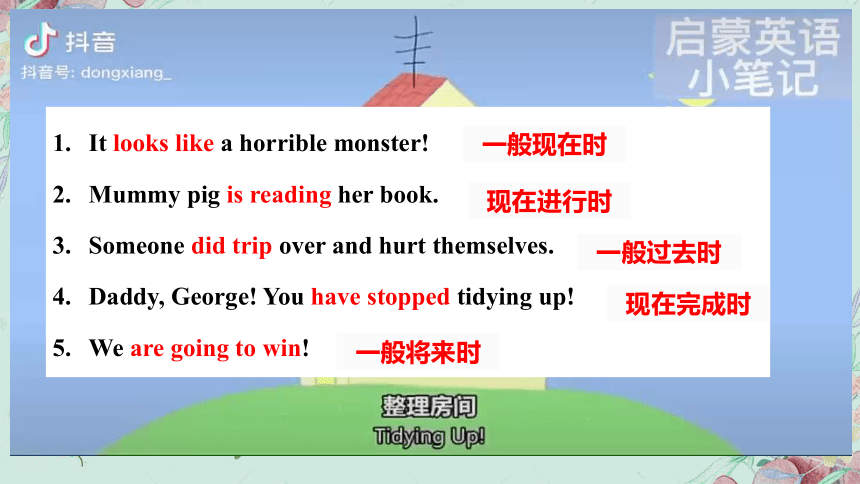
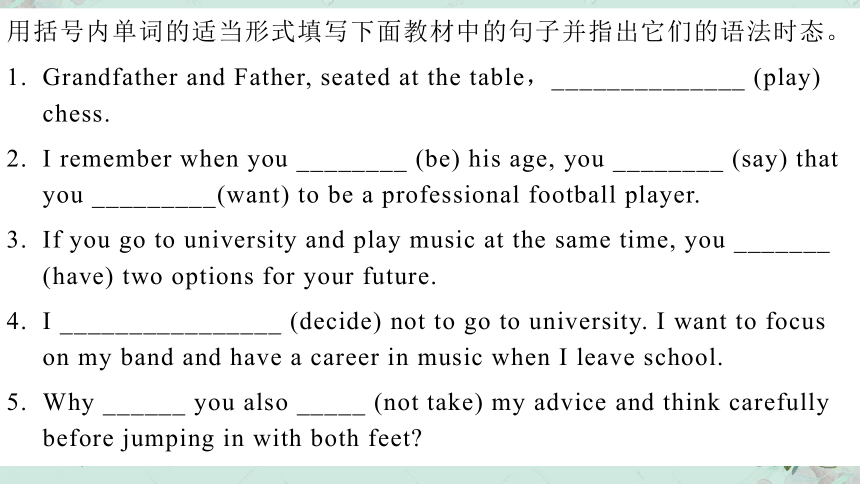

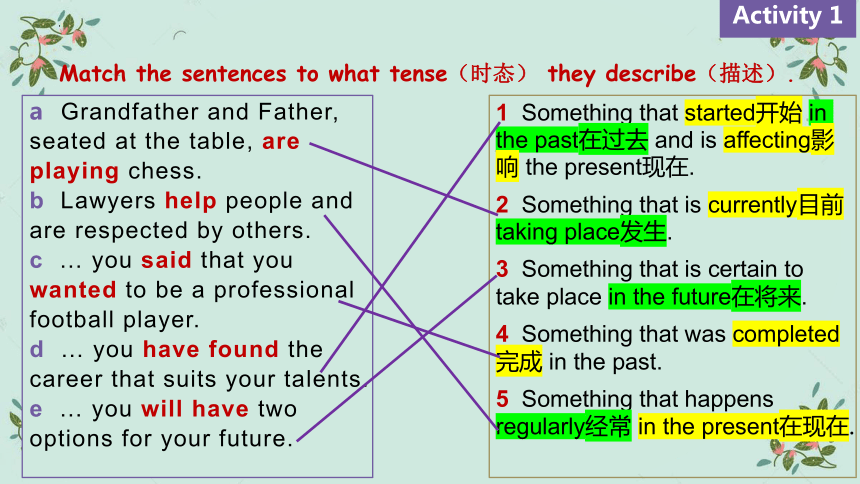
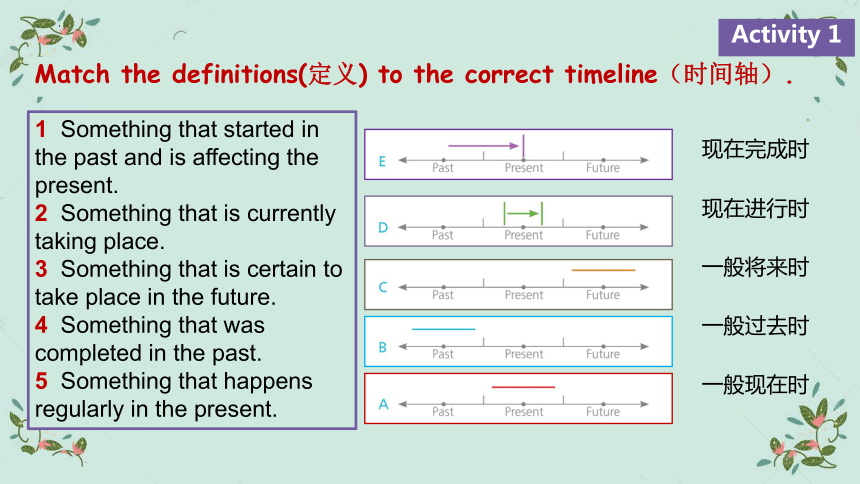
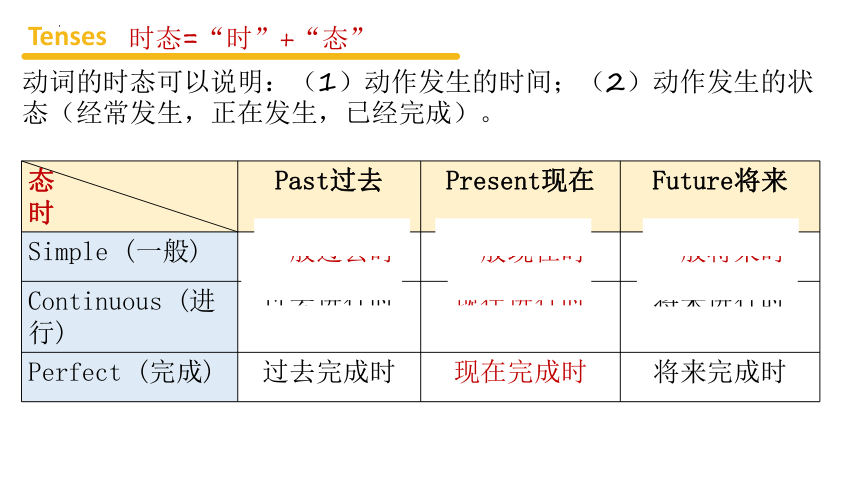
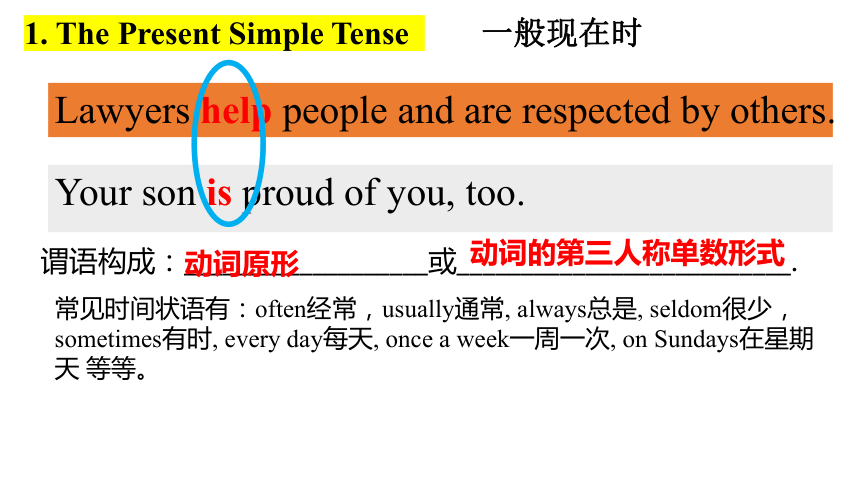
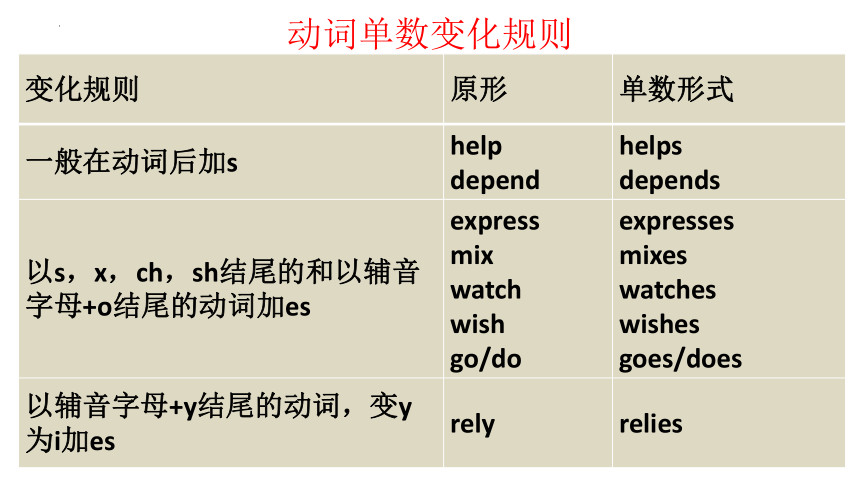
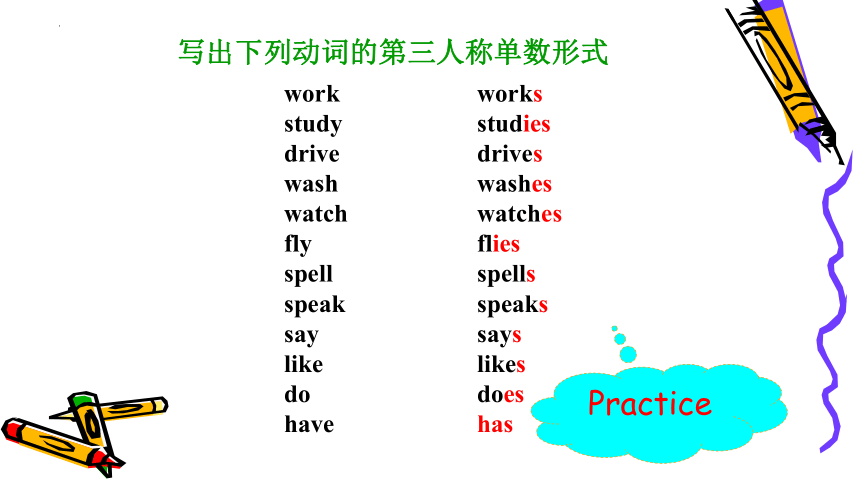
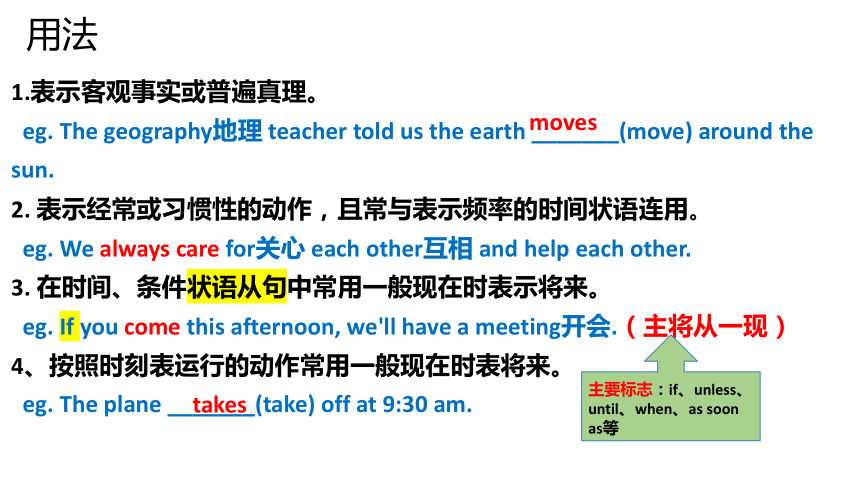
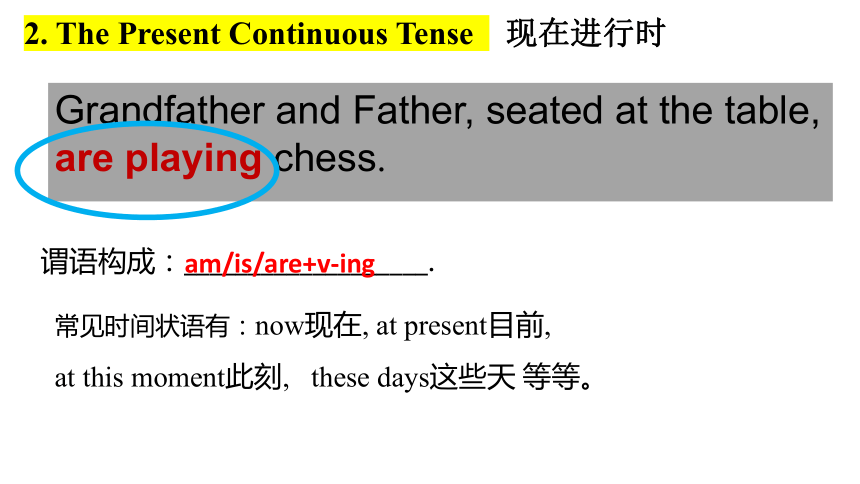
文档简介
(共40张PPT)
Unit 3 Family Matters
Using Languages
-Grammar
Review复习: Tense时态
It looks like a horrible monster!
Mummy pig is reading her book.
Someone did trip over and hurt themselves.
Daddy, George! You have stopped tidying up!
We are going to win!
一般现在时
现在进行时
一般过去时
现在完成时
一般将来时
用括号内单词的适当形式填写下面教材中的句子并指出它们的语法时态。
Grandfather and Father, seated at the table,______________ (play) chess.
I remember when you ________ (be) his age, you ________ (say) that you _________(want) to be a professional football player.
If you go to university and play music at the same time, you _______ (have) two options for your future.
I ________________ (decide) not to go to university. I want to focus on my band and have a career in music when I leave school.
Why ______ you also _____ (not take) my advice and think carefully before jumping in with both feet
用括号内单词的适当形式填写下面教材中的句子并指出它们的语法时态。
Grandfather and Father, seated at the table,______________ (play) chess.
I remember when you ________ (be) his age, you ________ (say) that you _________(want) to be a professional football player.
If you go to university and play music at the same time, you _________ (have) two options for your future.
I ________________ (decide) not to go to university. I want to focus on my band and have a career in music when I leave school.
Why ______ (not) you also _____ (take) my advice and think carefully before jumping in with both feet
are playing
were
said
wanted
will have
have decided
don’t
take
一般现在时
现在进行时
一般过去时
现在完成时
一般将来时
a Grandfather and Father, seated at the table, are playing chess.
b Lawyers help people and are respected by others.
c … you said that you wanted to be a professional football player.
d … you have found the career that suits your talents.
e … you will have two options for your future.
Match the sentences to what tense(时态) they describe(描述).
1 Something that started开始 in the past在过去 and is affecting影响 the present现在.
2 Something that is currently目前 taking place发生.
3 Something that is certain to take place in the future在将来.
4 Something that was completed完成 in the past.
5 Something that happens regularly经常 in the present在现在.
Activity 1
1 Something that started in the past and is affecting the present.
2 Something that is currently taking place.
3 Something that is certain to take place in the future.
4 Something that was completed in the past.
5 Something that happens regularly in the present.
Activity 1
Match the definitions(定义) to the correct timeline(时间轴).
现在完成时
现在进行时
一般将来时
一般过去时
一般现在时
Tenses
态 时 Past过去 Present现在 Future将来
Simple (一般) 一般过去时 一般现在时 一般将来时
Continuous (进行) 过去进行时 现在进行时 将来进行时
Perfect (完成) 过去完成时 现在完成时 将来完成时
动词的时态可以说明:(1)动作发生的时间;(2)动作发生的状态(经常发生,正在发生,已经完成)。
时态=“时”+“态”
Lawyers help people and are respected by others.
Your son is proud of you, too.
1. The Present Simple Tense 一般现在时
谓语构成:___________________或__________________________.
动词原形
动词的第三人称单数形式
常见时间状语有:often经常,usually通常, always总是, seldom很少,sometimes有时, every day每天, once a week一周一次, on Sundays在星期天 等等。
动词单数变化规则
变化规则 原形 单数形式
一般在动词后加s help depend helps
depends
以s,x,ch,sh结尾的和以辅音字母+o结尾的动词加es express mix watch wish go/do expresses
mixes
watches
wishes
goes/does
以辅音字母+y结尾的动词,变y为i加es rely relies
写出下列动词的第三人称单数形式
work
study
drive
wash
watch
fly
spell
speak
say
like
do
have
works
studies
drives
washes
watches
flies
spells
speaks
says
likes
does
has
Practice
用法
1.表示客观事实或普遍真理。
eg. The geography地理 teacher told us the earth _______(move) around the sun.
2. 表示经常或习惯性的动作,且常与表示频率的时间状语连用。
eg. We always care for关心 each other互相 and help each other.
3. 在时间、条件状语从句中常用一般现在时表示将来。
eg. If you come this afternoon, we'll have a meeting开会.(主将从一现)
4、按照时刻表运行的动作常用一般现在时表将来。
eg. The plane _______(take) off at 9:30 am.
moves
takes
主要标志:if、unless、until、when、as soon as等
Grandfather and Father, seated at the table, are playing chess.
2. The Present Continuous Tense 现在进行时
谓语构成:___________________.
am/is/are+v-ing
常见时间状语有:now现在, at present目前,
at this moment此刻, these days这些天 等等。
现在分词的构成
构成规则 原形 现在分词
一般在动词后加ing help depend依靠 helping
depending
以不发音的e结尾的,去e加ing name make naming
making
以辅元辅结尾,在一个重音上,中间的元音为短元音,双写末尾的辅音字母再加ing prefer occur发生 preferring
occurring
少数以ie结尾的动词,变ie为y再加ing die lie dying
lying
以oe,ee,ye结尾的动词直接加ing see dye染色 hoe锄地 seeing
dyeing
hoeing
写出下列动词的ing形式
work
study
drive
get
see
fly
prefer
visit
stop
like
lie
have
working
studying
driving
getting
seeing
flying
preferring
visiting
stopping
liking
lying
having
Practice
用法
1.表示此刻或现阶段正在进行的动作。
eg. They're having a meeting开会.
2. 表示按计划或安排即将发生的动作(现在进行时表将来),常用于 go,come, leave离开, start开始, arrive到达, return返回 ,stay停留, run out用完 等动词。
Food supplies in the flood-stricken area __________(run) out.We must act immediately before there’s none left.
are running
洪灾区的食物供给快要见底了。我们必须在食物吃完前马上行动。
Translation
3. The Future Simple Tense 一般将来时
You will have two options for your future.
Playing in a band will help you make lots of friends.
谓语构成:___________________
用法:
shall / will + 动词原形
表将要发生的动作或存在的状态。
常见时间状语有:tomorrow明天, the day after tomorrow后天,in 2035,in the future在未来,next month下个月 ,a week later一周后,
in twenty minutes20分钟之后 等等。
其它结构
1. be going to do
(1) be going to do 表示根据某种迹象预示着要发生某事
Translate翻译:乌云正在聚集,我想快要下雨了。
Dark clouds are gathering.It is going to rain soon,I think.
(2) “be going to do” 含有“计划,打算”的意思,而will则没有。
eg.She _________ try her effort尽力 to struggle奋斗 for the university.
We ________ _ (graduate)here in three years.
is going to
will graduate
2. “ be to +动词原形”
(1) 表示“将”“计划”“安排”(意思接近be going to)
eg. He is to visit Japan next year.
(2) 表示“义务”“应该”(意思接近于should, must, ought to, have to)
No one is to leave the building. (翻译)
任何人不得离开这栋楼。
3. “be about to +动词原形”表示即将发生的动作,后面一般不跟时间状语,
常和when连用 。
Translate: 汤姆正要关上窗户,就在这时一只鸟引起了他的注意。
Tom was about to close the window when his attention was caught
by a bird.
4. The Past Simple Tense 一般过去时
I told him to study something useful.
You said you wanted to be a professional football player.
表示过去某一时间点或一段时间的习惯性动作或状态
谓语构成:___________________
用法:
动词的过去式
常见的时间状语: yesterday昨天, two days ago两天前,last year去年,the other day 前几天,once upon a time从前 ,just now 刚才,
in the old days在过去,in the past在过去,two weeks ago两周前,
in 1898,an hour ago一个小时前 等等.
规则动词的过去式和过去分词变化规则
变化规则 原形 过去式 过去分词
一般在动词后加ed help depend helped depended helped
depended
以不发音的e结尾的,直接加d like liked liked
以辅音字母+y结尾的动词,变y为i加ed rely relied relied
以辅元辅结尾,在一个重音上,中间的元音为短元音,双写末尾的辅音字母再加ed stop permit stopped permitted stopped
permitted
写出下列动词的过去式和过去分词
work
study
drive
visit
stop
fly
prefer
speak
say
like
do
have
worked worked
studied studied
drove driven
visited visited
stopped stopped
flew flown
preferred preferred
spoke spoken
said said
liked liked
did done
had had
Practice
在英式英语中,travel的过去式和过去分词为travelled,travelled。而在美式英语中,travel的过去式和过去分词为traveled,traveled。类似的还有quarrel吵架,model模拟,dial拨号,signal示意。
Translate:
Whenever the Browns went during their visit, they were given a warm welcome.
布朗一家无论什么时候去,都会受到热烈欢迎。
Where did you go just now
5. The Present Perfect Tense 现在完成时
He has decided not to go to university.
You have found the career that suits your talent.
谓语构成:___________________
have/ has + 过去分词
规则动词的过去式和过去分词变化规则
变化规则 原形 过去式 过去分词
一般在动词后加ed help depend helped depended helped
depended
以不发音的e结尾的,直接加d like liked liked
以辅音字母+y结尾的动词,变y为i加ed rely relied relied
以辅元辅结尾,在一个重音上,中间的元音为短元音,双写末尾的辅音字母再加ed stop permit stopped permitted stopped
permitted
用法
1.表示到现在为止已发生或完成的动作,强调对现在的影响。
eg. I __________ (see) the film already.
2. 表示从过去某一时刻开始一直持续到现在的动作或状态,有可能继续持续下去,常与“since+时间点”自从、“for +时间段”持续多久, before之前, so far, up to now,until/till now到目前为止,in the last/past few years在过去几年里, recently最近,over these years这些年,ever曾经,already已经,yet已经 等时间状语连用。
eg. She ___________ a dancer for ten years. 她成为舞者已经十年了
I have learned English six years.
have seen
has been
3.用于现在完成时的句型
(1)It is (has been)+ 一段时间+since从句 自从...以来,多久了
(2)This (That/It) is the +序数词+ time that 从句(现在完成时)
这是某人第几次做某事
(3)This (That/It) is the+adj最高级+名词+that从句(现在完成时)
这是最........
have visited
It is the most rewarding book that I have ever read.
Translate:这是我读过的最有价值的书。
eg. It is the first time that I __________(visit) the city.
(best/finest/most interesting)
一般过去时与现在完成时
现在完成时强调的是该完成的动作或状态对现在的影响,而一般过去时强调的是过去发生了某一动作或有某种状态这样一个事实,其结果不影响到现在。现在完成时不能与过去时的时间状语连用。
I have had lunch.
I had lunch at 12 o’clock.
上述句中谓语动词分别使用了不同的时态。句①用的是_________时,句②用的是________时,句③用的是_________时,句④用的是_________时,句⑤用的是_________时
You know you can always turn to your dad for a chat.
I’ve decided not to go to university.
I knew you'd say that.
The music industry is developing fast now.
If you go to university and play music at the sametime, you will have two options for your future.
一般现在
现在完成
一般过去
现在进行
一般将来
Summary
五种时态的基本形式及用法
一般现在时
现在进行时
现在完成时
一般过去时
一般将来时
主语+will/shall+动词原形
主语+have/has+过去分词
主语+am/is/are+表语;主语+do/does
主语+was/were+表语或主语+did
主语+am/is/are+现在分词
时态 构成 标志词
一般现在时
一般过去时
一般将来时
现在进行时
现在完成时
主语+do/does
主语+am/is/are
主语+did
主语+was/were
主语+will do
主语+am/is/are+doing
主语+have/has done
often,always,usually,
sometimes, every day, once a week
now, at present,
at this moment, these days,
完成:already, yet,never,
时间名词+before
延续:for+时间段 since+时间点,so far, uo to now,recently,in the past few years
yesterday, last week,
in 1900, two days ago
tomorrow, in the future, in 2035,
a week later
Identify the tense of the following sentences.
1.They do morning exercises every day.
2.The students are preparing for the examination.
3.We paid a visit to the Great Wall last week.
4.She has learnt English for 3 years.
5.They are going to meet outside the school gate.
6.During his middle school years,he played football nearly every day.
7.All the living things on the earth depend on the sun.
8.He will help his sister with her lessons.
9.The workers are building a big library.
10.I have never heard of that before.
用所给动词的正确形式填空
1.My dream school starts at 8:30 a.m.and ____________ (end) at 3:30 p.m.
2.If it ____________ (be) fine tomorrow,we'll visit the park.
3.—Is Peter coming
—No,he ____________ (change) his mind改变主意 after a phone call at the last minute.
4.He works in Beijing and knows London very well,for he ____________ (live) there for a long time.
5.Work hard and you ____________ (be) successful in being admitted to被录取 one of universities.
ends
is
changed
lived
will be
6.When I called you this morning,nobody ____________ (answer) the phone接电话.
7.Progress进展 ____________ (be) so far very great and we are sure that the work will be finished完成 on time按时.
8.I hope you ____________ (behave) yourself得体一点,守规矩 at the dinner party.
9.—What's that terrible noise喧闹
—The neighbours邻居 ____________ (prepare) for a party.
10.I can guess you were in a hurry着急. Look,you ____________ (wear穿着) your sweater毛衣 inside out.
answered
has been
will behave
are preparing
are wearing
A lot of evidence证据______ __(found) so far
Great changes _____________ (take) place发生 in this city in the past 10 years.
Mrs. Brown _________ (work) in a high school for three years in the past, but she works in a bank now.
—I thought I had reminded提醒 you to take out带出去 the rubbish垃圾.
—Oh,I forgot. I ________ (do) it right now马上.
The meeting _______ (begin) smoothly顺利地, but then things started to go wrong.
Hurry up, Peter! The taxi ___________ (wait) for us at the gate of the hotel.
When I was a kid, I always _______ (ask) a lot of questions问题, for I was curious好奇的 about everything一切事物 around周围.
The Spring Festival春节 always ___________ (remind使想起) people of hope. During such a festival, we visit走访 our relatives and friends to bring our best wishes祝愿 to everyone.
has been found
have taken
worked
will do
began
is waiting
asked
reminds
1.妈妈答应给我买一辆自行车。(promise)
Mother promised she would buy me a bike.
2.当夏天到来时,他们将邀请他们的学生来采摘新鲜蔬菜。(pick)
When summer comes, they will invite their students to pick the fresh vegetables.
3.去年夏天我去了伦敦度假。我在那里只待了一周。(spend)
Last summer I went to London for a holiday, I spent just a week there.
4. 这是我第一次来成都,我真的对这里人们的生活方式印象深刻。(impress)
This is the first time I have come to Chengdu and I am truly impressed by the lifestyle of the people here.
5.听到这种奇怪的噪音,托尼很害怕,然后开始哭起来。(过去时)
Hearing the strange noise, Tony was scared and began to cry.
Translation
Dad:Adam, Sally. come here. Mum____(have) something to tell you.
Adam:Coming!
Sally: Coming!
Mum: I _______(call) Grandma yesterday and invited her to our house this Sunday.We _________ (throw) her a big birthday party! So, we each need to choose a present.
Adam: I know-- I __________(give) her a new tea set.
She______(like) drinking tea!
Mum: Good choice. What about you, Sally
Sally: I______________(think of) making a scarf for her.
Mum: Good idea. I’m sure Grandma________(love) it. Oh, _____ you _______(finish) the guest list yet, dear
Dad: Yes, I have, and I’m working on the invitations.
Mum: Ok. So we still need to prepare food and drinks. I’ll make a checklist.
has
called
will throw
will give
likes
am thinking of
will love
have
finished
邀请某人去……
为她举办一个盛大的生日聚会
挑选礼物
一套新茶具
为她织围巾
宾客清单
准备邀请函
准备食物饮品
制作清单
Activity 2
Look at the checklist for Grandma’s birthday party and talk about the preparations. Use as many of the tenses in Activity 1 as possible.
They have decided to throw a party to celebrate Grandma’s birthday.
They have all chosen presents for Grandma.
Dad drew up the guest list on Wednesday,
and he is now making the invitations.
Mum will prepare food and drinks for the party on Sunday morning.
起草
What do people usually do during the birthday party
light the candles and sing “Happy Birthday” together
cut and eat the birthday cake
play games
receive some presents
eat noodles
制作邀请函
Activity 3
举办一个盛大的生日聚会
为奶奶的生日举办一个惊喜聚会
挑选/赠送/接收礼物
起草宾客清单
准备邀请函
准备食物和饮品
制作清单
邀请客人
点燃蜡烛
唱生日歌
切并吃生日蛋糕
玩游戏
throw a big birthday party
throw a surprise party for Grandma’s birthday
choose /give/receive presents
draw up the guest list
work on the invitations /make the invitations
prepare food and drinks
make a checklist
invite the guest
light the candles
sing “Happy Birthday”
cut and eat the birthday cake
play games
Thank you !
Unit 3 Family Matters
Using Languages
-Grammar
Review复习: Tense时态
It looks like a horrible monster!
Mummy pig is reading her book.
Someone did trip over and hurt themselves.
Daddy, George! You have stopped tidying up!
We are going to win!
一般现在时
现在进行时
一般过去时
现在完成时
一般将来时
用括号内单词的适当形式填写下面教材中的句子并指出它们的语法时态。
Grandfather and Father, seated at the table,______________ (play) chess.
I remember when you ________ (be) his age, you ________ (say) that you _________(want) to be a professional football player.
If you go to university and play music at the same time, you _______ (have) two options for your future.
I ________________ (decide) not to go to university. I want to focus on my band and have a career in music when I leave school.
Why ______ you also _____ (not take) my advice and think carefully before jumping in with both feet
用括号内单词的适当形式填写下面教材中的句子并指出它们的语法时态。
Grandfather and Father, seated at the table,______________ (play) chess.
I remember when you ________ (be) his age, you ________ (say) that you _________(want) to be a professional football player.
If you go to university and play music at the same time, you _________ (have) two options for your future.
I ________________ (decide) not to go to university. I want to focus on my band and have a career in music when I leave school.
Why ______ (not) you also _____ (take) my advice and think carefully before jumping in with both feet
are playing
were
said
wanted
will have
have decided
don’t
take
一般现在时
现在进行时
一般过去时
现在完成时
一般将来时
a Grandfather and Father, seated at the table, are playing chess.
b Lawyers help people and are respected by others.
c … you said that you wanted to be a professional football player.
d … you have found the career that suits your talents.
e … you will have two options for your future.
Match the sentences to what tense(时态) they describe(描述).
1 Something that started开始 in the past在过去 and is affecting影响 the present现在.
2 Something that is currently目前 taking place发生.
3 Something that is certain to take place in the future在将来.
4 Something that was completed完成 in the past.
5 Something that happens regularly经常 in the present在现在.
Activity 1
1 Something that started in the past and is affecting the present.
2 Something that is currently taking place.
3 Something that is certain to take place in the future.
4 Something that was completed in the past.
5 Something that happens regularly in the present.
Activity 1
Match the definitions(定义) to the correct timeline(时间轴).
现在完成时
现在进行时
一般将来时
一般过去时
一般现在时
Tenses
态 时 Past过去 Present现在 Future将来
Simple (一般) 一般过去时 一般现在时 一般将来时
Continuous (进行) 过去进行时 现在进行时 将来进行时
Perfect (完成) 过去完成时 现在完成时 将来完成时
动词的时态可以说明:(1)动作发生的时间;(2)动作发生的状态(经常发生,正在发生,已经完成)。
时态=“时”+“态”
Lawyers help people and are respected by others.
Your son is proud of you, too.
1. The Present Simple Tense 一般现在时
谓语构成:___________________或__________________________.
动词原形
动词的第三人称单数形式
常见时间状语有:often经常,usually通常, always总是, seldom很少,sometimes有时, every day每天, once a week一周一次, on Sundays在星期天 等等。
动词单数变化规则
变化规则 原形 单数形式
一般在动词后加s help depend helps
depends
以s,x,ch,sh结尾的和以辅音字母+o结尾的动词加es express mix watch wish go/do expresses
mixes
watches
wishes
goes/does
以辅音字母+y结尾的动词,变y为i加es rely relies
写出下列动词的第三人称单数形式
work
study
drive
wash
watch
fly
spell
speak
say
like
do
have
works
studies
drives
washes
watches
flies
spells
speaks
says
likes
does
has
Practice
用法
1.表示客观事实或普遍真理。
eg. The geography地理 teacher told us the earth _______(move) around the sun.
2. 表示经常或习惯性的动作,且常与表示频率的时间状语连用。
eg. We always care for关心 each other互相 and help each other.
3. 在时间、条件状语从句中常用一般现在时表示将来。
eg. If you come this afternoon, we'll have a meeting开会.(主将从一现)
4、按照时刻表运行的动作常用一般现在时表将来。
eg. The plane _______(take) off at 9:30 am.
moves
takes
主要标志:if、unless、until、when、as soon as等
Grandfather and Father, seated at the table, are playing chess.
2. The Present Continuous Tense 现在进行时
谓语构成:___________________.
am/is/are+v-ing
常见时间状语有:now现在, at present目前,
at this moment此刻, these days这些天 等等。
现在分词的构成
构成规则 原形 现在分词
一般在动词后加ing help depend依靠 helping
depending
以不发音的e结尾的,去e加ing name make naming
making
以辅元辅结尾,在一个重音上,中间的元音为短元音,双写末尾的辅音字母再加ing prefer occur发生 preferring
occurring
少数以ie结尾的动词,变ie为y再加ing die lie dying
lying
以oe,ee,ye结尾的动词直接加ing see dye染色 hoe锄地 seeing
dyeing
hoeing
写出下列动词的ing形式
work
study
drive
get
see
fly
prefer
visit
stop
like
lie
have
working
studying
driving
getting
seeing
flying
preferring
visiting
stopping
liking
lying
having
Practice
用法
1.表示此刻或现阶段正在进行的动作。
eg. They're having a meeting开会.
2. 表示按计划或安排即将发生的动作(现在进行时表将来),常用于 go,come, leave离开, start开始, arrive到达, return返回 ,stay停留, run out用完 等动词。
Food supplies in the flood-stricken area __________(run) out.We must act immediately before there’s none left.
are running
洪灾区的食物供给快要见底了。我们必须在食物吃完前马上行动。
Translation
3. The Future Simple Tense 一般将来时
You will have two options for your future.
Playing in a band will help you make lots of friends.
谓语构成:___________________
用法:
shall / will + 动词原形
表将要发生的动作或存在的状态。
常见时间状语有:tomorrow明天, the day after tomorrow后天,in 2035,in the future在未来,next month下个月 ,a week later一周后,
in twenty minutes20分钟之后 等等。
其它结构
1. be going to do
(1) be going to do 表示根据某种迹象预示着要发生某事
Translate翻译:乌云正在聚集,我想快要下雨了。
Dark clouds are gathering.It is going to rain soon,I think.
(2) “be going to do” 含有“计划,打算”的意思,而will则没有。
eg.She _________ try her effort尽力 to struggle奋斗 for the university.
We ________ _ (graduate)here in three years.
is going to
will graduate
2. “ be to +动词原形”
(1) 表示“将”“计划”“安排”(意思接近be going to)
eg. He is to visit Japan next year.
(2) 表示“义务”“应该”(意思接近于should, must, ought to, have to)
No one is to leave the building. (翻译)
任何人不得离开这栋楼。
3. “be about to +动词原形”表示即将发生的动作,后面一般不跟时间状语,
常和when连用 。
Translate: 汤姆正要关上窗户,就在这时一只鸟引起了他的注意。
Tom was about to close the window when his attention was caught
by a bird.
4. The Past Simple Tense 一般过去时
I told him to study something useful.
You said you wanted to be a professional football player.
表示过去某一时间点或一段时间的习惯性动作或状态
谓语构成:___________________
用法:
动词的过去式
常见的时间状语: yesterday昨天, two days ago两天前,last year去年,the other day 前几天,once upon a time从前 ,just now 刚才,
in the old days在过去,in the past在过去,two weeks ago两周前,
in 1898,an hour ago一个小时前 等等.
规则动词的过去式和过去分词变化规则
变化规则 原形 过去式 过去分词
一般在动词后加ed help depend helped depended helped
depended
以不发音的e结尾的,直接加d like liked liked
以辅音字母+y结尾的动词,变y为i加ed rely relied relied
以辅元辅结尾,在一个重音上,中间的元音为短元音,双写末尾的辅音字母再加ed stop permit stopped permitted stopped
permitted
写出下列动词的过去式和过去分词
work
study
drive
visit
stop
fly
prefer
speak
say
like
do
have
worked worked
studied studied
drove driven
visited visited
stopped stopped
flew flown
preferred preferred
spoke spoken
said said
liked liked
did done
had had
Practice
在英式英语中,travel的过去式和过去分词为travelled,travelled。而在美式英语中,travel的过去式和过去分词为traveled,traveled。类似的还有quarrel吵架,model模拟,dial拨号,signal示意。
Translate:
Whenever the Browns went during their visit, they were given a warm welcome.
布朗一家无论什么时候去,都会受到热烈欢迎。
Where did you go just now
5. The Present Perfect Tense 现在完成时
He has decided not to go to university.
You have found the career that suits your talent.
谓语构成:___________________
have/ has + 过去分词
规则动词的过去式和过去分词变化规则
变化规则 原形 过去式 过去分词
一般在动词后加ed help depend helped depended helped
depended
以不发音的e结尾的,直接加d like liked liked
以辅音字母+y结尾的动词,变y为i加ed rely relied relied
以辅元辅结尾,在一个重音上,中间的元音为短元音,双写末尾的辅音字母再加ed stop permit stopped permitted stopped
permitted
用法
1.表示到现在为止已发生或完成的动作,强调对现在的影响。
eg. I __________ (see) the film already.
2. 表示从过去某一时刻开始一直持续到现在的动作或状态,有可能继续持续下去,常与“since+时间点”自从、“for +时间段”持续多久, before之前, so far, up to now,until/till now到目前为止,in the last/past few years在过去几年里, recently最近,over these years这些年,ever曾经,already已经,yet已经 等时间状语连用。
eg. She ___________ a dancer for ten years. 她成为舞者已经十年了
I have learned English six years.
have seen
has been
3.用于现在完成时的句型
(1)It is (has been)+ 一段时间+since从句 自从...以来,多久了
(2)This (That/It) is the +序数词+ time that 从句(现在完成时)
这是某人第几次做某事
(3)This (That/It) is the+adj最高级+名词+that从句(现在完成时)
这是最........
have visited
It is the most rewarding book that I have ever read.
Translate:这是我读过的最有价值的书。
eg. It is the first time that I __________(visit) the city.
(best/finest/most interesting)
一般过去时与现在完成时
现在完成时强调的是该完成的动作或状态对现在的影响,而一般过去时强调的是过去发生了某一动作或有某种状态这样一个事实,其结果不影响到现在。现在完成时不能与过去时的时间状语连用。
I have had lunch.
I had lunch at 12 o’clock.
上述句中谓语动词分别使用了不同的时态。句①用的是_________时,句②用的是________时,句③用的是_________时,句④用的是_________时,句⑤用的是_________时
You know you can always turn to your dad for a chat.
I’ve decided not to go to university.
I knew you'd say that.
The music industry is developing fast now.
If you go to university and play music at the sametime, you will have two options for your future.
一般现在
现在完成
一般过去
现在进行
一般将来
Summary
五种时态的基本形式及用法
一般现在时
现在进行时
现在完成时
一般过去时
一般将来时
主语+will/shall+动词原形
主语+have/has+过去分词
主语+am/is/are+表语;主语+do/does
主语+was/were+表语或主语+did
主语+am/is/are+现在分词
时态 构成 标志词
一般现在时
一般过去时
一般将来时
现在进行时
现在完成时
主语+do/does
主语+am/is/are
主语+did
主语+was/were
主语+will do
主语+am/is/are+doing
主语+have/has done
often,always,usually,
sometimes, every day, once a week
now, at present,
at this moment, these days,
完成:already, yet,never,
时间名词+before
延续:for+时间段 since+时间点,so far, uo to now,recently,in the past few years
yesterday, last week,
in 1900, two days ago
tomorrow, in the future, in 2035,
a week later
Identify the tense of the following sentences.
1.They do morning exercises every day.
2.The students are preparing for the examination.
3.We paid a visit to the Great Wall last week.
4.She has learnt English for 3 years.
5.They are going to meet outside the school gate.
6.During his middle school years,he played football nearly every day.
7.All the living things on the earth depend on the sun.
8.He will help his sister with her lessons.
9.The workers are building a big library.
10.I have never heard of that before.
用所给动词的正确形式填空
1.My dream school starts at 8:30 a.m.and ____________ (end) at 3:30 p.m.
2.If it ____________ (be) fine tomorrow,we'll visit the park.
3.—Is Peter coming
—No,he ____________ (change) his mind改变主意 after a phone call at the last minute.
4.He works in Beijing and knows London very well,for he ____________ (live) there for a long time.
5.Work hard and you ____________ (be) successful in being admitted to被录取 one of universities.
ends
is
changed
lived
will be
6.When I called you this morning,nobody ____________ (answer) the phone接电话.
7.Progress进展 ____________ (be) so far very great and we are sure that the work will be finished完成 on time按时.
8.I hope you ____________ (behave) yourself得体一点,守规矩 at the dinner party.
9.—What's that terrible noise喧闹
—The neighbours邻居 ____________ (prepare) for a party.
10.I can guess you were in a hurry着急. Look,you ____________ (wear穿着) your sweater毛衣 inside out.
answered
has been
will behave
are preparing
are wearing
A lot of evidence证据______ __(found) so far
Great changes _____________ (take) place发生 in this city in the past 10 years.
Mrs. Brown _________ (work) in a high school for three years in the past, but she works in a bank now.
—I thought I had reminded提醒 you to take out带出去 the rubbish垃圾.
—Oh,I forgot. I ________ (do) it right now马上.
The meeting _______ (begin) smoothly顺利地, but then things started to go wrong.
Hurry up, Peter! The taxi ___________ (wait) for us at the gate of the hotel.
When I was a kid, I always _______ (ask) a lot of questions问题, for I was curious好奇的 about everything一切事物 around周围.
The Spring Festival春节 always ___________ (remind使想起) people of hope. During such a festival, we visit走访 our relatives and friends to bring our best wishes祝愿 to everyone.
has been found
have taken
worked
will do
began
is waiting
asked
reminds
1.妈妈答应给我买一辆自行车。(promise)
Mother promised she would buy me a bike.
2.当夏天到来时,他们将邀请他们的学生来采摘新鲜蔬菜。(pick)
When summer comes, they will invite their students to pick the fresh vegetables.
3.去年夏天我去了伦敦度假。我在那里只待了一周。(spend)
Last summer I went to London for a holiday, I spent just a week there.
4. 这是我第一次来成都,我真的对这里人们的生活方式印象深刻。(impress)
This is the first time I have come to Chengdu and I am truly impressed by the lifestyle of the people here.
5.听到这种奇怪的噪音,托尼很害怕,然后开始哭起来。(过去时)
Hearing the strange noise, Tony was scared and began to cry.
Translation
Dad:Adam, Sally. come here. Mum____(have) something to tell you.
Adam:Coming!
Sally: Coming!
Mum: I _______(call) Grandma yesterday and invited her to our house this Sunday.We _________ (throw) her a big birthday party! So, we each need to choose a present.
Adam: I know-- I __________(give) her a new tea set.
She______(like) drinking tea!
Mum: Good choice. What about you, Sally
Sally: I______________(think of) making a scarf for her.
Mum: Good idea. I’m sure Grandma________(love) it. Oh, _____ you _______(finish) the guest list yet, dear
Dad: Yes, I have, and I’m working on the invitations.
Mum: Ok. So we still need to prepare food and drinks. I’ll make a checklist.
has
called
will throw
will give
likes
am thinking of
will love
have
finished
邀请某人去……
为她举办一个盛大的生日聚会
挑选礼物
一套新茶具
为她织围巾
宾客清单
准备邀请函
准备食物饮品
制作清单
Activity 2
Look at the checklist for Grandma’s birthday party and talk about the preparations. Use as many of the tenses in Activity 1 as possible.
They have decided to throw a party to celebrate Grandma’s birthday.
They have all chosen presents for Grandma.
Dad drew up the guest list on Wednesday,
and he is now making the invitations.
Mum will prepare food and drinks for the party on Sunday morning.
起草
What do people usually do during the birthday party
light the candles and sing “Happy Birthday” together
cut and eat the birthday cake
play games
receive some presents
eat noodles
制作邀请函
Activity 3
举办一个盛大的生日聚会
为奶奶的生日举办一个惊喜聚会
挑选/赠送/接收礼物
起草宾客清单
准备邀请函
准备食物和饮品
制作清单
邀请客人
点燃蜡烛
唱生日歌
切并吃生日蛋糕
玩游戏
throw a big birthday party
throw a surprise party for Grandma’s birthday
choose /give/receive presents
draw up the guest list
work on the invitations /make the invitations
prepare food and drinks
make a checklist
invite the guest
light the candles
sing “Happy Birthday”
cut and eat the birthday cake
play games
Thank you !
